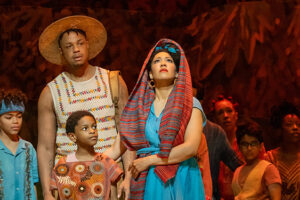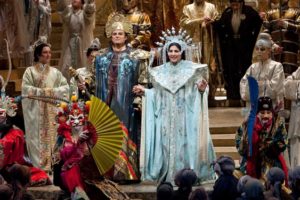

Cornetto fancier Pluhar.
New York fans of 17th century Italian vocal music should be rejoicing this month. Lincoln Center will present all three of Monteverdi’s operas beginning on the 18th, but last Thursday presented a tough choice. William Christie conducted Juilliard 415 in tasty morsels by Monteverdi, but instead I opted for the Boston Early Music Festival Chamber Ensemble doing Agostino Steffani’s duetti da camera.
Then Friday evening at Zankel Hall L’Arpeggiata offered a compendium of Luigi Rossi’s music; both were satisfying evenings, rare opportunities to experience live the works of two important yet little known masters.
While Monteverdi then Cavalli dominated the musical scene of Venice, Rossi’s stronghold was Rome. Although he wrote just two operas, his strikingly dramatic vocal music, both sacred and secular, has been increasingly revived and recorded over the past few decades. Theorbist Christina Pluhar, director of L’Argeggiata, conceived a roughly 90-minute program “La Lyra d’Orfeo” which alternated solo scenes from the operas Il Palazzo incantato and Orfeo with a number of Rossi’s more informal canzonettas.
The origin of the evening’s most striking piece, a complicated monologue (its text covered two entire pages of the program!) Lamento d’Arione wasn’t specified.
Consisting of eleven other instrumentalists and two singers on this occasion, Pluhar’s group has gained notoriety for its “jazzy” interpretations with funky added percussion of 17th and 18th century music but Thursday’s program mostly played it straight other than in a rollicking rendition of an infectious instrumental ciacona by Cazzati.
What I continue to find most off-putting about Pluhar’s performances as I had several years ago at an all-Cavalli evening is her over-use of a cornetto in her exceptionally rich realization of the accompaniment. A quick scan of a half-dozen Rossi recordings in my library found that cornetti were only used in one and then sparingly. The most grievous instance occurred during the evening’s sole duet where the prominent cornetto nearly drowned out the singers.
Statuesque Belgian Céline Scheen revealed an interestingly complex soprano with a bright, tight vibrato. Her intently dramatic approach contrasted markedly with mezzo Giuseppina Bridelli’s more subdued manner. Scheen’s bottled-up vocal production perhaps contributed to her indistinct diction, a real drawback given text-driven nature of Rossi’s pieces.
Bridelli’s darker, warmer voice combined with her much clearer words proved more appealing, and her earnest intensity made the shifting moods and striking musical contrasts of the long Lamento d’Arione the highlight of the program.
Throughout the evening it was hard not to compare Rossi’s work with Monteverdi’s later music; so I wasn’t entirely surprised when the sole encore proved to be a ravishing rendition of the final duet from L’Incoronazione di Poppea which however probably isn’t even by Monteverdi.
During the short talk before Thursday’s Steffani concert, I was reminded by Stephen Stubbs and Paul O’Dette that the first performance I ever heard by the Boston Early Music Festival was a production of Rossi’s Orfeo at Tanglewood twenty years ago. Stubbs and the evening’s eloquent gambist Erin Headley also make up two-thirds of Tragicomedia whose spellbinding recording on Teldec of Rossi duets and trios called “Le Canterine Romane” (sadly out of print) is one of my very favorite CDs ever. But Stubbs and company have turned their attentions to Steffani, a late seventeenth-century master whose career centered mostly in Germany.
Despite the impression given during that talk by Stubbs & O’Dette, interest in Steffani dates back decades to the dogged efforts of American conductor Newell Jenkins who performed five of the composer’s operas in the 1970s and 80s. As a matter of fact I attended what turned out to be Jenkins’s final Steffani exhumation, 1692’s Le Rivali Concordi at Alice Tully Hall in 1987.
While the 2011 BEMF staging of Niobe, Regina di Tebe, later recorded by Erato, did garner attention, Covent Garden had revived the opera a year earlier while Cecilia Bartoli’s 2012 Mission CD (the one with the bald-pated mezzo glowering and holding up a crucifix) probably did the most in generating recent attention to Steffani, who with Alessandro Scarlatti is a crucial transitional figure in the evolution of Italian opera from its mid-17th century explosion via Rossi, Cavalli and Cesti to its early 18th century peak exemplified by Handel who by the way borrowed liberally from Steffani.
Nor are the duetti da camera featured on Thursday’s concert and the group’s new CD (as yet unheard by me) exactly obscure. I first heard a number of them on Alan Curtis’s superb collection more than thirty years ago, and Attilio Cremonesi’s group with Rossana Bertini and Claudio Cavina remains a favorite. More recently, the collection “Se Con Stille Frequenti” featuring Sara Mingardo and various female partners inevitably contains three Steffani duets.
Yet these marvelous, influential works certainly merit BEMFCE’s attention.
These duets may not conform to conventional expectations; they do not feature a pair of “characters” bantering back and forth. There is no dialogue; rather a poetic text, divided into strophes, expounds on a precise situation involving the heights or depths of love. Most often the two voices echo each other often in wildly florid flights but occasionally one singer will have a verse to herself which is then followed by one by the other; they then reunite for the conclusion. Few works subscribe to a conventional da capo form.
The concert and its companion CD, dubbed “Duets of Love and Passion” (are there any other kind?), feature three voice combinations: soprano-soprano, soprano-tenor and soprano-bass. Accompanied by BEMFCE’s superb continuo group including Stubbs, O’Dette, Headley and Maxine Eilander and Michael Sponseller, the four soloists excelled in extravagant, alluring vocal writing.
Boston’s long-time early music diva Amanda Forsythe glittered throughout, her sweet high soprano easily negotiating the challenging intricacies of her music. I last heard Hungarian soprano Emöke Baráth six years ago as a callow Sesto in Handel’s Giulio Cesare. She has since matured into an extraordinarily accomplished performer, her lush ebony-tinged soprano contrasted entrancingly with Forsythe’s in the spellbindingly lovely “Su, ferisci, alato arciero” which ended the evening’s first half.
If a less vivacious and communicative artist than Forsythe, she made clear why she’s become many baroque conductors’s soprano of choice: she recorded the title role in Stradella’s La Doriclea just last month.
If their coloratura was less easy than the ladies’s, Colin Balzer and Christian Immler were stylish collaborators. Balzer’s burnished sweet tenor happily sports a solid and mellow middle register while Immler’s pungent high bass provided an enjoyably earthy contrast to both his angelic partners.
Although each concert had its lighter moments, both surprisingly ended on notes of mortality. The conclusion of an aria from Rossi’s Orfeo pleads “A morire, a morire” (Let’s die, let’s die), while the next-to-last verse of Steffani’s “Fulminate, saettate” culminates in the self-lacerating
Sia pur rigida la sorte
Ch’a penar mi condannó
Che ben merita la morte
Chi la vita ricusò.
Let the fate indeed be severe
Which thus condemned me to suffer
He deserves death
Who refuses life.
BEMF’s continues its commitment to Steffani with a staging of his Orlando generoso starring Forsythe as Angelica recently announced as the opera centerpiece of its 2019 Festival,
For anyone wanting to explore these two wonderful composers, a DVD has just been released of Rossi’s Orfeo, and while the superb Les Arts Florissants recording of Orfeo is out of print on CD, the mp3 is still available for download.
The stunning “Le Canterine romane’ mentioned earlier is unfortunately out of print but used copies are likely available. Surprisingly Bartoli’s collection of Steffani opera arias is no longer available but the Curtis and Cremonesi duet collections are still available, as does a lovely collection of Steffani cantatas and duets with Monique Zanetti and Pascal Bertin.
As for Steffani’s operas, those wanting to preview BEMF’s upcoming Orlando generoso may do so, while BEMF’s recording of Niobe remains clearly preferable to Covent Garden’s.























Comments